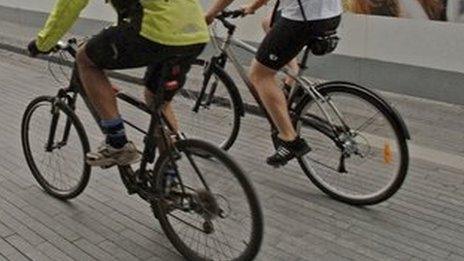Yorkshire cities face 'tough decisions' in bid to boost cycling
- Published
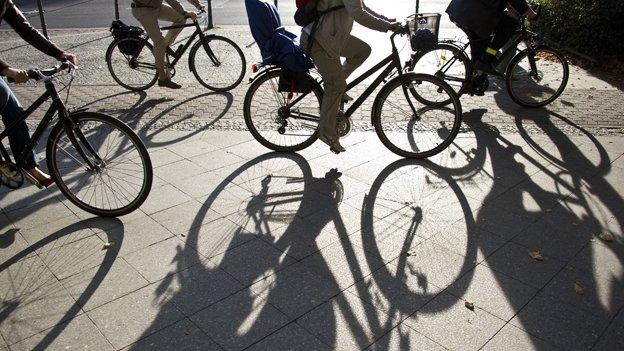
Only one in 100 adults ride to work in Leeds and Sheffield
With Yorkshire hosting the first two stages of the Tour de France this summer, local authorities are hoping the event will help to spark a return to levels of cycling not seen since the 1950s.
But cycle campaigners say "tough decisions" need to be made if the region's major cities are to hit targets for increasing the number of trips made by bike.
Lizzie Reather, chairwoman of Leeds Cycling Campaign, external, said: "Leeds is not that different from other cities in the UK.
"Most of them are not designed with a bike in mind, so most people find cycling in Leeds and other cities an intimidating experience.
"We know there's been a big boost to leisure cycling with the Tour coming, but people choosing to cycle to work is a little bit more challenging [and] that also needs to be backed up by policy changes from the local governments.
"At the moment the priority with most road building schemes is to ensure smooth vehicle flow and when we would quite like to put in cycle lanes, often the council will say, 'we can't do that because we have to maintain vehicle flow'.
"Someone has got to make some tough decisions on who is the priority in Leeds."
Currently, only one in 100 adults rides to work in Leeds and Sheffield, with the figure for Bradford being one in 200. The national average is one in 50, a figure beaten by cities such as Liverpool, London and Manchester.
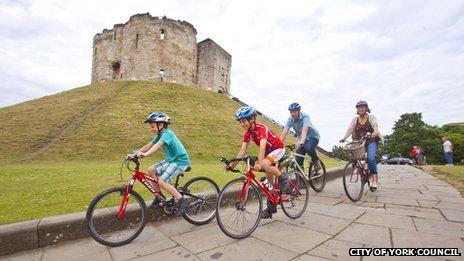
Cycling is more popular in York than in the region's other cities
Yorkshire's generally disappointing figures for cycling - York is the exception to the rule, with nearly one in 10 adults commuting by bike - are not surprising when death and serious injury statistics are factored in. They are up by nearly a third between 2009 and 2012, with the number for all injuries up by over a quarter.
In Leeds, cyclists account for almost 10% of all serious injuries on the roads, despite making up only 1% of the total traffic.
Despite, or perhaps because of this, Bradford and Leeds hope to get closer to York's figures by tripling bike usage by 2019, and reaching 7.5% of all journeys by 2026.
The cornerstone of their "Highway to Health" plan is a 14-mile cycle "superhighway" from east Leeds to Bradford, with other projects including an upgrade of a 14-mile section of the Leeds-Liverpool Canal towpath, an extension of 20mph speed limits in residential areas and better bike parking.
Councillor Val Slater, Bradford Council's executive member for housing, planning and transport, said, "[This] is an important scheme that will improve connectivity between our two cities and create new opportunities for businesses, jobs, housing and health."
Campaigners welcome these steps, but say they do not go nearly far enough to reverse the negative impact of 60 years of car-friendly transport policy.
The sport's national governing body, British Cycling, is calling on policy-makers to "truly embed cycling as an everyday part of British culture and a viable transport option for people of all ages and backgrounds".
Pointing to the examples of Amsterdam and Copenhagen, British Cycling has launched a 10-point "Time to Choose Cycling" , externalplan to reach a target of 10% of all journeys by bike by 2025, and a quarter of all journeys by bike by 2050.
The Manchester-based body says this would save the National Health Service £250m a year, improve the environment, help traffic flow for every road user and even boost local businesses.
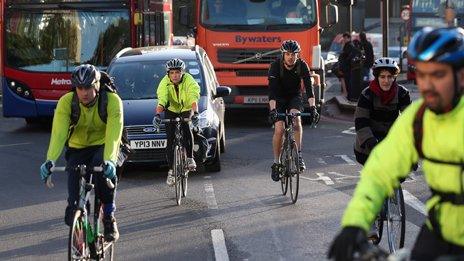
Yorkshire's leaders hope the Tour de France will get people back on their bikes
British Cycling's policy adviser and former Olympic champion Chris Boardman said: "In the 1970s, the Netherlands made a conscious choice to put people first and make cycling and walking their preferred means of transport.
"It is no coincidence they are also one of the healthiest and happiest nations in the world.
"Local and national government needs to wake up and realise that cycling is the solution to so many of the major problems Britain is now facing."
As a whole, Britain currently spends £2 per head on cycling, compared to £27 per head in The Netherlands. The UK's budget for roads is £75 per head.
That said, London is a good example of what can be achieved in a relatively short period. The number of daily bike trips on its roads has risen by 150% since 2000, and, contrary to public perception, the number of deaths per trip has fallen by 60% over the same period.
London's hosting of the 2007 Tour de France Grand Depart was part of this strategy to get people out of their cars and back on their bikes.
Yorkshire's leaders are pinning their hopes on the 2014 edition of the race having the same effect.
- Published20 November 2013
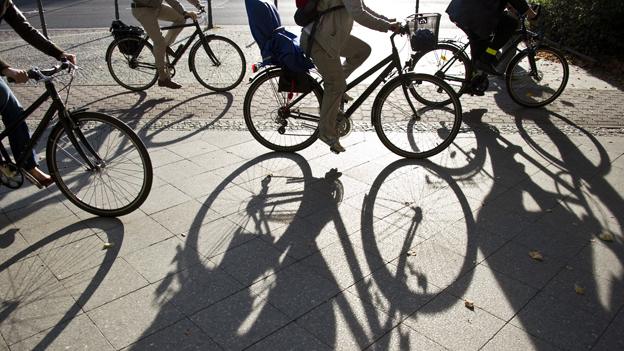
- Published12 August 2013
